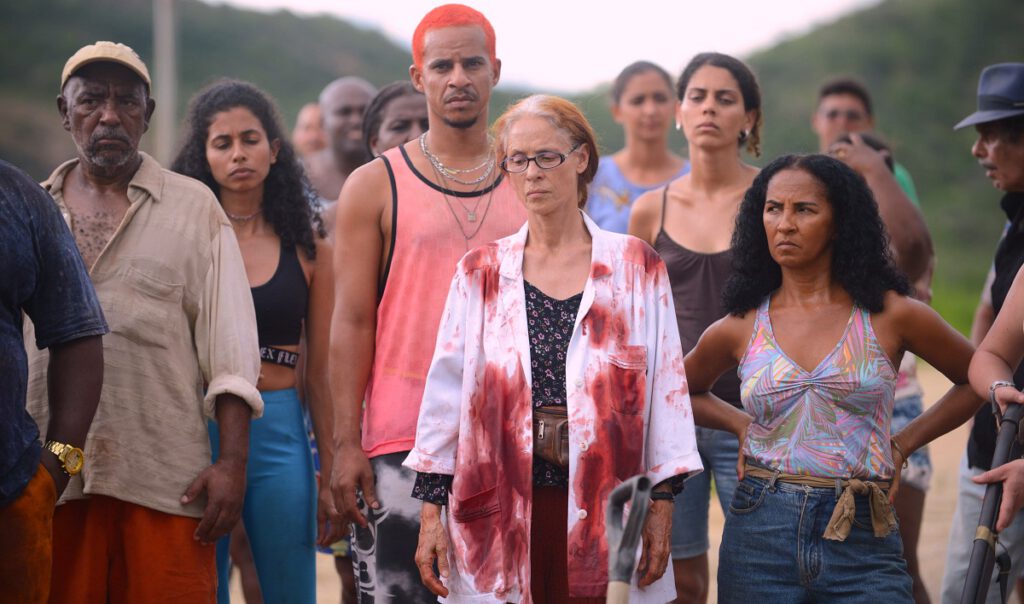Cultures in turmoil, historical evils, refugees, and ghosts all play a part in today's films at Cannes.
Brazilian director Kleber Mendonca Filho is no stranger to working with ensemble casts. His sprawling 2012 film "Neighboring Sounds" was set in an apartment complex where many stories intersected in conflict and class difference. He came to Cannes for the first time in 2016 with the comedy/drama "Aquarius" in competition. That film was a showcase for Sonia Braga, but also featured a large ensemble cast. He's back in competition this year with "Bacurau," co-directed with his production designer Juliano Dornelles.
"Bacurau" literally takes a village, with nominal stars Braga and Udo Kier in supporting roles among a cast that includes many non-professionals. The film tells a shape-shifting story that mixes aspects of genres that include folkloric drama, sci-fi, political satire, and action/thriller. An opening line of text reads: "A few years from now."
A tanker truck of drinking water barrels down a dusty road in Brazil's northeastern region, carrying a man and a woman toward the isolated village of Bacurau. Strange things are afoot: water is a scarce bartered commodity in these parts, and the wanted outlaw Lunga, a local legend, is holed up somewhere nearby. The woman passenger is coming home to Bacurau for the funeral of her 94-year-old grandmother Carmelita.
Bacurau looks like a place that time forgot, steeped in superstitious old ways. With the staging of Carmelita's funeral, Mendonca and Dornelles at first appear to be adopting a magic realist style. The entire village follows the coffin, singing a song that sinisterly suggests witchcraft. Lyrics include, "Spells are floating in the air, the work of an evil sorcerer." As the crowd looks on, a flood of water gushes from the seams of the old woman's polished wooden coffin.
Like many other genre portents floated by "Bacurau," this one is a feint. A short time later, a flying saucer zooms across the sky. Any suggestion that this film is moving in a direction of either sci-fi or folksy tradition is wiped away with the grim discovery that seven villagers, including children, have been savagely murdered, their bloody corpses shot full of holes. Bacurau suddenly no longer appears on any web sites or maps. It is as if it has been wiped from the earth.
Mendonca and Dornelles have yet more genre-bending moves in store. The flying saucer is in fact a large drone, belonging to a group of American tourists holed up in a hidden compound not far away. Dressed in camouflage and bulletproof vests, and nursing an arsenal of collectors' weapons that range from vintage Thompson submachine guns to high-tech weapons with silencers and laser sights, these are not ordinary tourists. They are eager, trigger-happy hunters, and their chosen prey is human. Bacurau is the hunting preserve selected and primed for their pleasure by group leader Michael (Udo Kier).
"Bacurau" is not always wholly successful in weaving all its narrative strains together in the course of what ultimately becomes an allegory for colonialism and its blowback. This film's ways of retribution and righteousness are sneaky, full of surprises, and often laced with humor.

Mati Diop, a French woman of Senegalese heritage, is the first female director of color ever selected to debut her film in the Cannes competition. "Atlantique" is her first feature, and it's a haunting and atmospheric tale of the supernatural, with a narrative based in a love story with a beautifully empowering coming of age aspect. Diop has a sure command of her craft, making magic with ambient light and everyday locations. It's not much of a stretch to speculate that Diop will be invited back to Cannes with future films, whether she wins a prize this year or not.
The urban landscape of Dakar, the setting for "Atlantique," is shrouded in fog. The rolling sea, an ever-present image in the film, is silver with pale light. In the office at the foot of an unfinished skyscraper tower, an agitated group of young construction workers is protesting the fact that they have not received their wages for four months. The developer continues to hold out, and they are turned away with nothing.
One of these young men, Souleiman (Ibrahima Traore) is courting Ada (Mama Sane), a middle-class girl who is arranged by her devout, upright parents to marry Omar, the son of a rich man, in ten days time. Ada loves Souleiman, and sneaks out of her bedroom window to meet him late at night at a beachside dance club where many of her girlfriends are also joining handsome boys from the construction crew. One night, the girls are heartbroken to learn that their young men have made the sudden decision to seek their fortunes in Spain, and like many refugees, they have set out from the Dakar shore packed together in a small rickety boat.
Ada is devastated, and to this point this is exclusively her story. Diop has effectively evoked the giddy camaraderie of girlfriends, the joy of secret love, and the girlish romanticism that can barely distinguish among the disparate thrills of passionate kisses, glittery shoes, and breathy promises. The marriage celebration is a scene that leaves Ada on the sidelines while guests eat, drink, and admire the gaudy furniture of the wedding night bedroom, open for them to ogle.
Two friends report to a disbelieving Ada that they have just spotted Souleiman lurking nearby. Soon, a fire alarm sounds. Someone has set the hideous satin-tufted marriage bed on fire. The damage to the premises is slight, but a stern young police inspector takes Ada into custody as an assumed accomplice.
The story takes a larger stage when a mysterious sweating and fainting malady overcomes a few of the women in Ada's circle. The police inspector too, becomes deathly ill, and it's all connected by a force and a happening that will soon be revealed. Ada receives texts, seemingly from Souleiman, but her girls warn her that it must be a police trick. Souleiman and his friends are back, seeking to right wrongs, but through a sorcery that is not of this earth.
"Atlantique" is a ravishing film to experience, glowing in attenuated light, and rife with eerie, magical moments. It presents an Africa that is a rare sight—wedded to the sea, and a conflicted home to strong girls with dreams.

Life in Afghanistan under the Taliban is a subject that has been addressed in the past in a feature-length animated film, Oscar-nominated "The Breadwinner." Today, the Un Certain Regard section of the Cannes festival premiered "The Swallows of Kabul," by Zabou Breitman and Elea Gobbe-Mevellec, an animated film in which the fates of two couples in 1998 Kabul become linked through accident and tragedy. While "The Breadwinner," the story of a plucky little girl saving her dad, was a film for the whole family, "The Swallows of Kabul," is most definitely designed for an adult audience.
The hand-drawn animation has the pleasing, muted appearance of watercolor painting, and is exceptionally detailed and subtly shaded, providing a greater than usual realism in its depiction of city settings. The content is disturbing and morally complex, treating subjects like sex, love, and temptation.
Young liberal-minded married teacher Mohsen is on his way home when he encounters the stoning execution of a woman being staged in the street. The men in the crowd heave their heavy rocks with gusto, and even little kids on the sidelines giggle and try to toss a few. Mohsen picks up a stone and reluctantly throws it. When the crowd disperses and the body is unceremoniously hauled away, he is left stunned with regret and shame.
His wife Zunaira, an artist and a sprightly beautiful woman, is at home working on a wall mural and tapping her foot to rap music. Mohsen returns, and their lovers' quarrel ends with lovemaking. A few days later, a frightening incident in the street results in Zunaira being publicly punished by the Taliban for wearing the wrong shoes. Another more serious quarrel between husband and wife ensues, and Mohsen is killed in a freak household accident. Zunaira is sent to prison for murder, and has been sentenced to die in the soccer stadium prior to the upcoming game.
Meanwhile, "The Swallows of Kabul" has also introduced Atiq, a middle-aged guard in the prison for women on death row. He is childless and a wounded war veteran, married late in life to a devoted wife who now has terminal cancer. He is a hard unemotional man who still expects to be waited on by the ailing woman. His best friend tells him to ditch her. "No man owes anything to a woman," he tells doubtful Atiq. "Find a nice, healthy virgin and have kids."
Zunaira ends up under Atiq's custody as his sole condemned prisoner. Her beauty disturbs and arouses him when he accidentally catches the sight of her without a burka. Religious taboos, guilt, lust and anger are churning in his conscience. He visits the deserted apartment of Zunaira and Mohsen, and pulling back a wall curtain, confronts her mural – graphic drawings of the couple embracing, and Zunaira's erotic nude self-portrait. It is an outrage in his sight and a religious offense, but ultimately a catalyst for change as it works on his mind.
One of the many beauties of "The Swallows of Kabul" is that it portrays every central character as a complex human being capable of change. A simple rant against Taliban evils would be easy and forgettable. This film threads an undying hope for the future through every shade of its tragedy and sacrifice.












